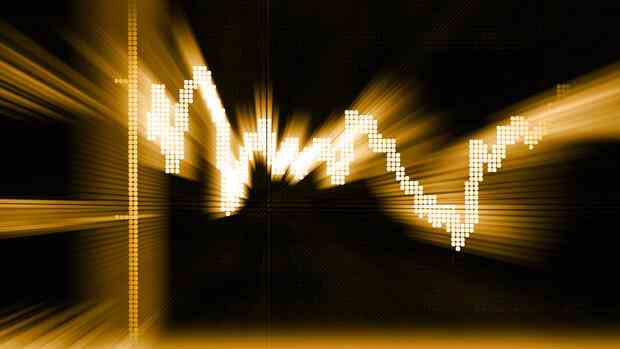Frankfurt Prices on the German stock market are under pressure on Friday. The leading index Dax fell significantly in the afternoon and was 1.7 percent lower at 15,210 points at the end of trading.
Only shortly before the market closed did the Dax break the important support mark at 15,250 points. This means that the sideways movement of the last few weeks within a trading range of 400 points has come to an end for the time being and a trend reversal could follow.
The main impact was the share slump in BASF and the recently reported and increased increase in prices for US consumer spending by 5.4 percent in January compared to the previous year. The BASF share loses about seven percent.
However, the current setbacks should be seen against the background of a previously remarkable rally: the Dax has gained a remarkable 29 percent compared to the low at the end of September – in just under five months. This was unexpected for most finance professionals.
At the same time, the rapid increase ensures that the Dax is only five percent away from its peak: On January 5 of last year, it reached its highest level of all time at 16,285 points. Shortly thereafter, the Ukraine war, the sharply rising inflation and the massive change in monetary policy by the central banks caused share and bond prices to plummet.
The well-known fund manager Jens Ehrhardt explains the marked increase, among other things, with the opening of China, after the country had long enforced strict corona rules. In addition, the fall in interest rates on US bonds made for more positive news on the stock markets.
For the founder of asset management DJE Kapital, short sellers play a key role. These investors borrow shares from banks or mutual funds and sell them in the hope of being able to buy them back at a lower price and then return them to the lender. The difference, minus a loan premium, is your profit.
As a reaction to the rising share prices in Europe, professional investors and traders had to cancel their bets and buy more paper. That also had price-increasing effects, says Ehrhardt.
Fund manager Jens Ehrhardt warns
However, Ehrhardt is very cautious about the future. He believes US equities are expensive and expects corporate earnings to be poor. The professional investors reckoned with a high interest rate of 5.25 to 5.50 percent for the interbank rate (Federal Funds) – i.e. the rate at which banks can lend money to each other. With Fed funds rates in excess of five percent, the dot-com bubble burst at the turn of the millennium and the markets slid into the 2007 financial crisis.
When looking at the global lead market Wall Street, Frank Thormann also expects negative surprises in terms of profits. The previous figures from the reporting season, which is almost over, should be treated with caution. Many companies had lowered their profit expectations in advance in order to be able to surprise positively on the day of the report.
>> Read also: Good economic data hardly allow prices to rise – because they have unpleasant side effects
Christian Jasperneite, chief strategist at Bank MM Warburg & Co, also sees risks. The fall in inflation is going very slowly. The US Federal Reserve is therefore well advised to raise key interest rates further and perhaps leave them at the high level longer than many have assumed. So bond yields could still rise further.
However, analysts at Bank Metzler believe there are limits to further rate hikes by the Fed and ECB. They cite a shrinking money supply for the US, the inverted yield curve, where short-term rates are higher than long-term rates, a recessionary real estate market, and fragile financial markets.
Individual values at a glance
BASF: The chemical company announced early in the morning that it was ending its share buyback program early. In addition, after a significant drop in earnings last year and the high burden of the energy crisis, the company is cutting 2,600 jobs worldwide – a large part of which is in Germany. For the current year, BASF is preparing for a further decline in earnings.
>> Read also: BASF is cutting 2,600 jobs worldwide – the chemical giant expects significant declines
Nagarro: After a critical magazine report and growing pressure from hedge funds, investors in Nagarro took to their heels. The shares of the Munich software developer collapsed on Friday by up to 17 percent to 90.10 euros, more than ever since the spin-off from the former parent company Allgaier at the end of 2020. After mandatory publications in the Federal Gazette, the hedge fund SIH Partners has its bets on one price decline widened; he now holds short positions of 2.64 percent of the shares. At the close of trading, the papers are still around ten percent in the red.
High Low: The construction group published good figures for the past financial year and gave a positive outlook. The share gains 3.6 percent and is the daily winner in the SDax.
Hensoldt: Shares in the defense electronics maker rose about 3 percent on the anniversary of Russia’s attack on Ukraine, hitting an all-time high. Since the beginning of the war, the SDax share price has increased almost two and a half times.
Here you can go to the page with the Dax course, here you can find the current tops & flops in the Dax.
More: AI reaches the next milestone – What it means for the semiconductor industry
